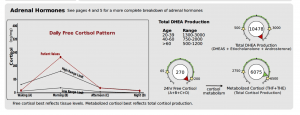Cortisol is often referred to as the “stress hormone.” It’s a vital steroid hormone produced by the adrenal glands located on the kidneys that impacts various bodily functions. From regulating metabolism to managing inflammation to aiding memory, cortisol plays a crucial role – including being integral to the body’s stress response.
Given its far-reaching effects, understanding cortisol levels is key for overall hormone health and issues related to fertility, pregnancy, menopause, and cancer care.
Why Cortisol Matters Across Key Life Stages
Fertility and Early Pregnancy – Trying to conceive and early pregnancy represent sensitive times when stress and elevated cortisol can disrupt menstrual cycles, ovulation, and implantation. High cortisol hinders reproductive capacity.
Pregnancy – While some cortisol increase supports fetal development, excessive levels put mothers at heightened risk for complications like gestational diabetes or preeclampsia, and may impact fetal growth and organ maturation. Careful cortisol management is vital.
Perimenopause and Menopause – Shifting estrogen levels during the menopausal transition can trigger hot flashes, sleep disruptions, and mood changes that spike cortisol release. Resulting adrenal imbalances can then further exacerbate symptoms in a vicious cycle.
Cancer Prevention and Recovery – High chronic stress and cortisol weakens immune defenses that protect against emerging cancers and inhibits anti-tumor activity important for recovery. Cortisol modulation aids prevention and patient outcomes.
Monitoring cortisol provides crucial insights tailored to reproductive, pregnancy, menopause, and cancer-related health at critical life stages for women. Effectively addressing high levels reduces risk and empowers positive outcomes.
How high cortisol levels impact other major hormones
Beyond its own far-reaching impacts, high cortisol also significantly disrupts the balance and function of other key hormones. Cortisol is intricately connected within several hormonal networks – when elevated chronically, these relationships become impaired, causing systemic effects.
High cortisol suppresses thyroid activity, reducing TSH, T4 conversion, and metabolic regulation. It decreases testosterone and alters estrogen/progesterone balance, affecting fertility and menstrual cycles. Prolonged elevation increases insulin resistance and blood sugar, risking diabetes. It also imbalances leptin/ghrelin, heightening appetite and potential weight gain. Finally, sustained high levels lead to HPA axis dysfunction, further exacerbating the hormonal cascades.
In summary, through multiple pathways, extended high cortisol levels can severely impact thyroid hormones, sex hormones, insulin, and appetite regulation. This hormonal disruption underlies numerous related health issues – from metabolic conditions to fertility problems and mood changes. Controlling high stress and cortisol is thus critical for overall hormonal balance and wellbeing.
Cortisol’s Diurnal Rhythm
Cortisol levels adhere to a natural daily, or diurnal, rhythm with a peak and trough. Cortisol’s Diurnal Rhythm displays a morning peak 30 minutes after waking to promote alertness. Levels then gradually decline to reach an evening trough around midnight, facilitating restorative sleep processes.

Morning Peak – Highest cortisol levels occur 30 minutes after waking as part of the cortisol awakening response (CAR), priming the body for the day’s demands.
Daytime Decline – Following the CAR spike, cortisol declines steadily to support winding down in the evening.
Evening Trough – Occurs around midnight to enable deep sleep stages and immune activity.
The diurnal cortisol rhythm can shift due to high stress, age, and certain health issues. Monitoring diurnal patterns is key for overall stress and metabolic management pertinent to hormonal health concerns.
Measuring Cortisol Levels
Cortisol tests help reveal insights into adrenal health and the body’s ongoing stress response:
Blood Tests – Snapshot of current levels but can be impacted by the stress of the test itself.
Saliva Tests – Useful for tracking CAR and rhythms over the day.
Urine Tests – Measure cortisol production over 24 hours.
Hair Tests – Offer months-long average levels of cortisol secretion.
Understanding one’s cortisol levels through testing guides effective stress and hormonal health management pertinent to fertility assistance, pregnancy, menopause, and cancer care.
At Dr. Ryu’s Natural medicine clinic, we assess cortisol as part of our complete Dutch sex and adrenal hormone test using a 24-hour urine analysis.





